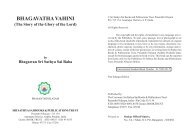Create successful ePaper yourself
Turn your PDF publications into a flip-book with our unique Google optimized e-Paper software.
Geetha Vahini 46 Geetha VahiniCHAPTER VIf you have an eye on the fruits of your actions,you are liable to be affected by worry, anxiety andrestlessness. The question may arise: if the fruitshave to be given up, how can one manage to live? But whythis weakness of heart, this nervousness? He who hasassured, “Yoga-kshemam vahamyaham” (I will absolutelytake care of your worldly and spiritual needs), will certainlylook after that. He will give the wherewithal and the means.After all, you have to consider, “Is a happy life important oris liberation from the circle of life and death more important?Happy living is only of short duration. The joy of liberationis eternal, unshakeable.On this point many commentators have exercised theirintelligence and written differently. Many have said that thegiving up of Phala or fruit is advised because there is noright or authority for the doer to desire the fruit.This is a great blunder. The Lord has said in the Geetha,“refuse the fruit” (maa phaleshu), that is to say: the deedyields results, but the doer should not desire the result, ordo it with the result in view. If Krishna’s intention was tosay that the doer has no right for the fruit, He would havesaid, “It is fruitless” na phaleshu, (na, meaning no). So, ifyou desist from karma, you will be transgressing the Lord’sCommand. That will be a serious mistake.When man has a right for engaging in karma, he has aright also for the fruit; no one can deny this or refuse hisright. But the doer can, out of his own free will anddetermination, refuse to be affected by the result, whetherfavourable or unfavourable. The Geetha shows the way:“Do—and deny the consequence.” The desire for the resultof your action is a sign of Rajo Guna. The giving up ofaction since you cannot benefit by the fruit is a sign ofThamo Guna (dullness, ignorance). To engage oneself inkarma, to know that the result will follow, and yet, not to beattached to it or getting concerned with it—that is the signof Sathwa Guna (pure).The Karma Yogi who has learnt this secret of “Karmacombined with Phalathyaga” should have Samabuddhi(equanimity), more than Sangabuddhi (mind attached tothe world). For, the Sangabuddhi draws him into attachmentsand entanglements. “This karma is mine, its results are dueto my endeavours. I am the person entitled to it,” such arethe thoughts which bind the doer. Krishna advises that oneshould rise above this Sangabuddhi. He declared that












